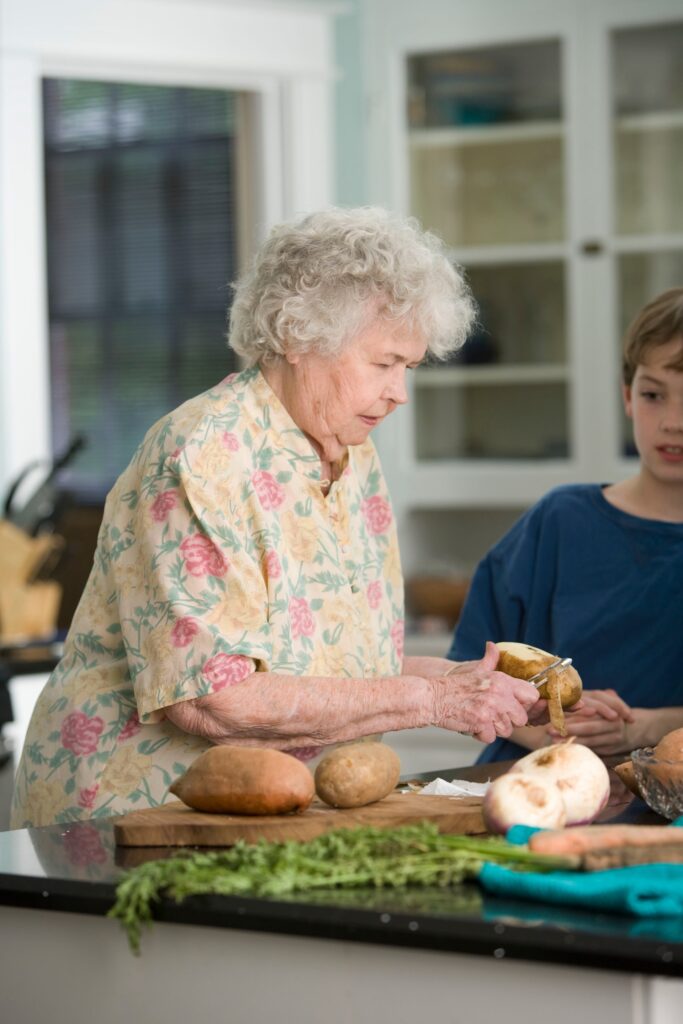TWD #8 Navigating Tricky Family Dynamics

Greetings dear friends and readers. As your companion on this journey of senior transitions, I’m always here to share my insights. Today, we dive into a topic that’s often surrounded by a cloud of sensitivity and emotion – tricky family dynamics during these transitions. Let’s explore how we can better understand these dynamics and learn to effectively manage them.
Moving Into A Family Member’s Home
Throughout our lives as parents, we naturally aim to present our best selves to our children. We often withhold concerns about money, relationships, and other adult worries to protect them. However, as we age, maintaining this persona becomes increasingly difficult. Our imperfections, past decisions we aren’t proud of, or even the simple inability to recall certain details can lead to feelings of guilt, shame, and embarrassment.
Moving into an adult child’s home can exacerbate these emotions as all aspects of life become more visible. Especially when financial constraints exist, these feelings can intensify. To navigate this, empathy becomes our strongest tool. It’s essential to reassure the parent that their worth isn’t defined by their past decisions or current situation. They are loved for who they are – a remarkable individual who has brought so much joy and love into the family.
The Importance of Conversations
This period is also an opportunity to celebrate the parent’s life. Reminiscing about beautiful memories, whether it’s a grand snowball fight, a memorable family vacation, or even a hilarious mishap, can help to foster feelings of security and positivity. Sharing these stories over time can enrich the bond between the parent and the family.
Recognizing potential issues in these conversations becomes crucial. If a parent is constantly deflecting or steering the conversation away from certain topics, it could indicate a struggle with openness. It’s essential to approach these instances gently and patiently, building trust and assuring them that they are loved unconditionally.
I recall my own experiences with my brother, who was reluctant to discuss financial matters. My nephew, with his admirable patience, managed to gain his trust, learning about his father’s financial situation, and took over his financial responsibilities. The key was ensuring these conversations remained private, always prioritizing my brother’s dignity.
The Problem of Ageism
Another challenge that may surface during these transitions is ageism – a cultural bias that older adults may internalize. If a family member makes statements like “I’m sure my memory will get worse” or “I’ll probably need a hip replacement,” they’re likely harboring ageist beliefs. Empowering them and giving them a sense of purpose can help combat these biases and enhance their confidence.
The Driving Conversation
One of the most sensitive topics during senior transitions is driving. This conversation can range from straightforward to incredibly complex. It’s a conversation that needs to be had before an accident happens, not after. For my mother, the realization came when her deteriorating vision made driving unsafe. It was a decision she made herself, but it was not without its emotional toll.
On the other hand, my father-in-law, a truck driver by profession, was not as receptive. A confrontation from my husband and his brother following a near-accident involving a school bus was necessary. It took a hard conversation about the potential legal and financial repercussions of an accident for him to finally hang up his keys.
However, there are ways to ease this transition, such as limiting driving to daylight hours, avoiding highways, hiring caregivers who can drive, or using ride-sharing apps. Assisted living facilities often provide transportation services, which could be another solution. As difficult as these conversations might be, they are crucial for the safety of our loved ones and others.
Compassion, understanding, and patience
Dear friends, these transitions are not without their challenges. But remember, we undertake them out of love, respect, and a deep desire to ensure our loved one’s well-being. Compassion, understanding, and patience are our best allies during these times.
As we move forward in this journey, we must remember the importance of open and honest conversations. We should approach these discussions with empathy, reassuring our loved ones that we hold them in high regard, irrespective of their past decisions or present circumstances.
Let us also cherish the many beautiful memories we’ve created with them. Sharing these experiences can provide comfort and reassurance, reminding our loved ones of the joy and love they’ve brought into our lives.
When it comes to confronting ageism, we must remain vigilant. Empowerment and purpose can be the antidotes to these biases, providing our loved ones with a sense of worth and contribution.
The topic of driving, albeit sensitive, is a necessary conversation. While challenging, it is crucial to remember that safety is paramount. By exploring alternative means of transportation and providing emotional support, we can make this transition smoother.
Navigating the Transition
Transitions can be intricate, but as we navigate these dynamics, we must remember the guiding principle of our journey – our unwavering love and respect for our loved ones. As we face the challenges, we also encounter moments of joy, reminiscence, and deeper connection.
As we conclude today’s conversation, I would like to encourage all of us to approach these transitions with empathy, patience, and understanding. Let’s continue to honor our loved ones with dignity and respect, cherishing the rich tapestry of their lives, and standing by them through every step of their journey.
Until our next interaction, stay blessed, and remember that in all our transitions, love and understanding make the journey worthwhile.
Warmly,
Carol Phillips
Seniors Real Estate Specialist and Certified Probate Real Estate Specialist in Phoenix
Author of “Transitions With Dignity, A Six Step Blueprint To Help Your Loved One Embrace Change”
Carol@CarolAzRealtor.com
CarolAzRealtor.com
TransitionsWithDignity.com
